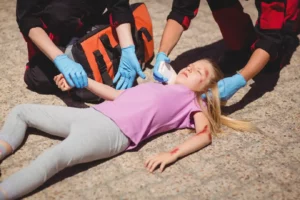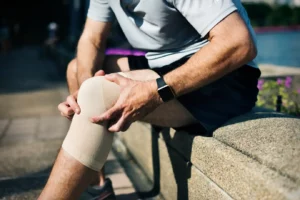Common Car Accident Injuries
1. Whiplash
Whiplash is a neck injury caused by a rapid back-and-forth motion, often occurring in rear-end collisions.
Symptoms:
- Neck pain and stiffness
- Headaches
- Dizziness or fatigue
Recovery Tips:
- Rest and avoid strenuous activities.
- Use ice or heat packs to manage pain.
- Physical therapy may help restore neck mobility.
2. Broken Bones
Fractures commonly affect the arms, legs, ribs, or collarbones during high-impact crashes.
Symptoms:
- Severe pain at the injury site
- Swelling or bruising
- Difficulty moving the affected area
Recovery Tips:
- Seek immediate medical attention.
- Use a cast, splint, or surgery, depending on the severity.
- Follow up with physical therapy to regain strength.
3. Head Injuries and Concussions
Head injuries range from minor bumps to traumatic brain injuries (TBIs).
Symptoms:
- Headache or confusion
- Memory loss
- Nausea or vomiting
Recovery Tips:
- Rest is essential for healing.
- Monitor symptoms closely and consult a doctor for worsening conditions.
- Avoid activities that could risk further head injury.
4. Spinal Cord Injuries
Spinal injuries can cause partial or complete loss of movement and sensation.
Symptoms:
- Severe back pain
- Weakness or numbness in the limbs
- Loss of bladder or bowel control in severe cases
Recovery Tips:
- Seek immediate medical care.
- Rehabilitation may include physical therapy and assistive devices.
- Emotional support is crucial for adapting to life changes.
5. Soft Tissue Injuries
Sprains, strains, and contusions affect muscles, ligaments, and tendons.
Symptoms:
- Swelling or bruising
- Limited range of motion
- Persistent pain
Recovery Tips:
- Rest the injured area and apply the R.I.C.E method (Rest, Ice, Compression, Elevation).
- Over-the-counter pain relievers can help manage discomfort.
- Gradual exercise may aid recovery.
6. Internal Injuries
Blunt force trauma can cause damage to internal organs or internal bleeding.
Symptoms:
- Abdominal pain or swelling
- Dizziness or fainting
- Signs of shock (pale skin, rapid heartbeat)
Recovery Tips:
- Internal injuries require immediate medical attention.
- Follow your doctor’s treatment plan and avoid physical strain.
Steps to Take After a Car Accident
1. Seek Immediate Medical Attention
Even if injuries seem minor, visit a doctor to rule out hidden damage. Delayed symptoms are common, particularly for whiplash and internal injuries.
2. Document Your Injuries
Keep detailed records of your medical visits, treatments, and symptoms. These can be essential for insurance claims or legal cases.
3. Follow Your Doctor’s Advice
Stick to prescribed treatments, including medications, physical therapy, or follow-up appointments.
4. Consider Legal Assistance
If the accident resulted from someone else’s negligence, consult a personal injury attorney to explore your options for compensation.
Recovering from Car Accident Injuries
1. Physical Recovery
- Attend all physical therapy sessions to regain strength and mobility.
- Maintain a healthy diet to support the healing process.
- Avoid activities that could worsen injuries.
2. Emotional Recovery
Car accidents can leave emotional scars, including anxiety or post-traumatic stress disorder (PTSD).
- Seek counseling or therapy to process trauma.
- Practice relaxation techniques like deep breathing or meditation.
- Stay connected with friends and family for support.
3. Financial Recovery
Dealing with medical bills and lost wages can add stress to recovery.
- File insurance claims promptly and keep detailed records of expenses.
- Work with a lawyer to ensure fair compensation for damages.
When to See a Doctor
Always consult a healthcare professional if:
- Pain worsens or persists.
- New symptoms appear after the accident.
- Injuries affect your ability to work or perform daily activities.
Final Thoughts
Car accident injuries can disrupt your life, but with proper care and a proactive approach, recovery is possible. By understanding the common types of injuries, seeking prompt treatment, and following a structured recovery plan, you can regain your health and move forward with confidence.
For more resources and expert advice, visit Injuries Wiki—your trusted partner in recovery.









